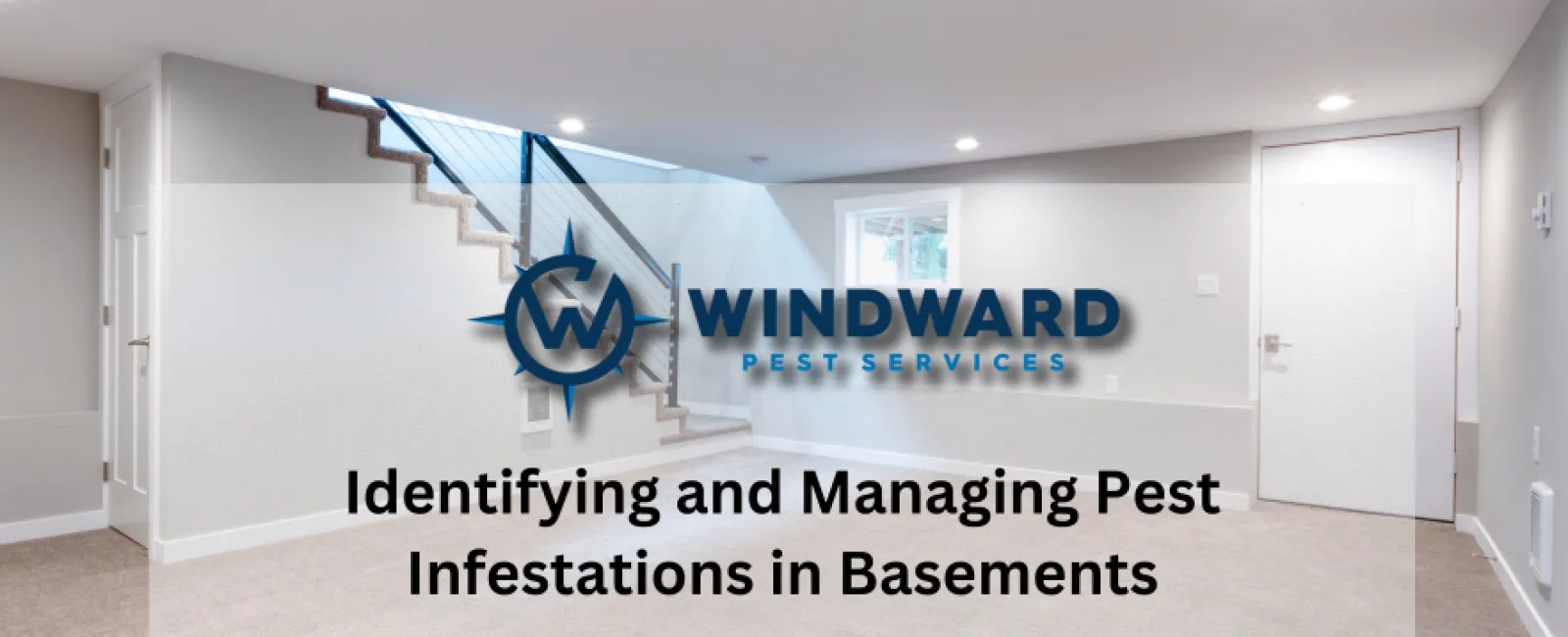Basements are often one of the most vulnerable areas of a home when it comes to pest infestations. Due to their lower levels, limited natural light, and higher humidity, they create an inviting environment for a variety of pests. Whether it's rodents, insects, or other unwanted invaders, keeping your basement pest-free is essential for maintaining the health, safety, and structural integrity of your home.
In this article, we'll explore the types of pests commonly found in basements, how to identify an infestation, and effective management strategies. We'll also cover how Windward Pest Services, your trusted Atlanta pest control provider, can help with Atlanta interior and exterior pest treatments to keep your home and basement free of pests.
Common Pests Found in Basements
A variety of pests can find their way into basements, attracted by darkness, moisture, and access to food. Some of the most common culprits include:
Rodents (Rats and Mice): Basements provide an ideal habitat for rodents due to their secluded nature and the availability of entry points. Rodents can cause significant damage by chewing on electrical wiring, insulation, and stored belongings. Additionally, their droppings can spread diseases, making it essential to address infestations quickly.
Spiders: Basements often serve as a sanctuary for spiders, especially in dark and damp corners. While most species are harmless, some venomous spiders like the brown recluse or black widow can pose health risks if disturbed. Spider infestations can also indicate the presence of other pests that spiders feed on.
Cockroaches: Cockroaches thrive in dark, moist environments and can easily find their way into basements through cracks, drains, or vents. They pose serious health risks as they carry allergens and pathogens that can trigger asthma and spread diseases. Cockroach infestations require prompt attention, as these insects reproduce rapidly.
Termites: While termites are more often associated with outdoor environments, they can also find their way into basements, particularly if the basement has wooden structures or furniture. Subterranean termites are known to tunnel through soil and attack homes from the ground up, targeting wooden beams and foundations.
Silverfish: Silverfish are small, wingless insects that thrive in humid environments like basements. They feed on paper products, fabric, and other organic materials. Though not harmful to humans, silverfish can cause damage to stored items such as books, cardboard boxes, and linens.
Ants: Certain species of ants, such as carpenter ants, are attracted to moist wood, making basements an ideal place to establish colonies. If left unchecked, carpenter ants can cause structural damage by burrowing into wood. Other ant species can invade the basement in search of food and water.
Why Basements Are Vulnerable to Pest Infestations
Basements are prone to pest infestations for several reasons, including:
Humidity and Moisture: Basements tend to be damp, particularly if there are leaks or poor ventilation. High moisture levels create an attractive environment for pests like cockroaches, silverfish, and termites that thrive in humid conditions.
Limited Natural Light: The dark, secluded nature of basements makes them a perfect hiding spot for pests. Rodents, spiders, and insects prefer areas with little to no light, where they can breed and nest undisturbed.
Access Points: Basements often have multiple entry points for pests, including cracks in the foundation, gaps around windows, drains, and vents. These small openings can allow pests to enter unnoticed and establish colonies.
Storage Areas: Basements are commonly used for storing items such as cardboard boxes, old furniture, and seasonal decorations. These materials provide hiding places and food sources for pests, particularly rodents and silverfish.
Proximity to Soil: Basements are located below ground level, making them closer to the soil, which is home to a variety of pests, including termites, ants, and other insects that can easily migrate indoors.
Identifying Signs of a Pest Infestation in Your Basement
Early detection of a pest infestation is critical for preventing significant damage and health risks. Here are some key signs that pests may be present in your basement:
Droppings or Urine: Rodents and cockroaches leave behind droppings and urine stains, which can often be found near baseboards, storage areas, or along walls.
Gnaw Marks: If you notice gnaw marks on electrical wires, wooden beams, or stored items, it may be a sign of a rodent infestation. Rodents tend to chew on anything to keep their teeth filed down, including wood, plastic, and metal.
Webs or Egg Sacs: The presence of spider webs or egg sacs, especially in corners or dark areas, indicates that spiders have made your basement their home.
Visible Damage to Wood: Termites and carpenter ants leave behind telltale signs of their presence, such as hollow-sounding wood, mud tubes, or piles of sawdust near wooden structures or furniture.
Strange Sounds: If you hear scratching, scurrying, or rustling noises coming from your basement, it's likely that rodents or other pests are hiding out of sight.
Unpleasant Odors: Certain pests, such as rodents and cockroaches, can produce strong, musty odors. The smell of decaying organic matter could also indicate the presence of pests.
Managing Pest Infestations with Windward Pest Services
If you suspect a pest infestation in your basement, it's important to take action quickly. Windward Pest Services offers expert Atlanta pest control solutions tailored to your specific needs. Here's how we can help:
Thorough Inspections: Our team will conduct comprehensive Windward Pest Services pest inspections to assess your basement and identify any signs of pest activity. We look for entry points, evidence of infestation, and vulnerabilities that may attract pests.
Targeted Treatments: Once we've identified the pests, we'll develop a customized treatment plan to eliminate them. Our Atlanta interior and exterior pest treatments are designed to address both current infestations and prevent future issues.
Sealing Entry Points: To prevent pests from entering your basement, our technicians will recommend or perform sealing of any cracks, gaps, or other entry points. This might include sealing foundation cracks, installing door sweeps, and securing vents.
Moisture Control: Addressing moisture issues is key to preventing pests in basements. We'll help you identify potential sources of moisture, such as leaks or poor drainage, and recommend solutions to reduce humidity levels.
Baiting and Trapping: For rodent infestations, we offer effective baiting and trapping methods to remove rodents from your basement safely. Our technicians will strategically place traps and monitor them to ensure successful removal.
Ongoing Monitoring: Pest control is an ongoing process. Windward Pest Services offers regular inspections and monitoring to ensure that your basement remains pest-free. Our team can install monitoring devices to detect early signs of re-infestation.
Pest infestations in basements can cause significant damage to your home's structure, pose health risks, and create an uncomfortable living environment. By recognizing the signs of an infestation and taking preventive measures, you can protect your basement and the rest of your home from unwelcome pests.
At Windward Pest Services, we're committed to providing top-tier Atlanta pest control services that keep pests out of your basement and your home. Whether you're dealing with rodents, cockroaches, termites, or other Georgia pests, our expert team is ready to help with Windward Pest Services pest inspections and Atlanta residential and commercial pest services.

